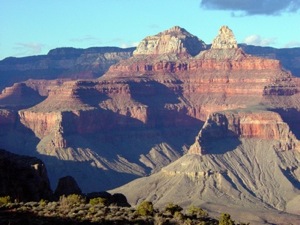Congressmen aim to derail Grand Canyon air tour rules
Effects of Noise on Wildlife, Human impacts, News, Vehicles, Wildlands Add commentsAs regular readers will know, the National Park Service completed an epic planning process earlier this year when it released proposed rules governing air tours at Grand Canyon National Park. After over two decades of discussion, including a failed attempt at coming to a consensus decision with all parties a few years back, NPS planners came up with an approach that was generally well-balanced. It allows airplanes and helicopters to remain a strong presence in the park, with 8000 more annual flights being allowed than have been occuring in recent years, and half the park still hearing aircraft throughout most of the day. On the plus side of the ledger for quiet recreation is a groundbreaking no-fly period for an hour after sunrise and an hour before sunset, a window of peace and quiet that will transform the back-country experience for the entire park. And, flight corridors in two popular back-country areas will alternate seasonally, so there is a time of year in each when it will be noticably more serene.

Nevertheless, the air tour industry claims the plan will put them out of business; it’s not at all clear how this could be, given the greater numbers of flights. I wonder whether the sunset period is especially popular for flights; if so, this could be a bitter pill for air tour operators to swallow. Yet it’s hard to deny that this is a time of day when river runners and hikers will find their experience immeasurably improved when birds, wind, and water are the dominant features of the evening soundscape.
Heeding the air tour griping, four Congressmen, two from Arizona and two from Nevada, have added an amendment to a Department of the Interior appropriations bill that would strip all funding for implementation of the rule. Earlier, the region’s two most powerful Senators, John McCain and Harry Reid, signed a letter opposing the plan, and McCain also attempted (and failed) to push through an amendment blocking it. For more on the current amendements, see this editorial in the Arizona Republic and this post that details objections from other Arizona representatives and the National Parks Conservation Association.
